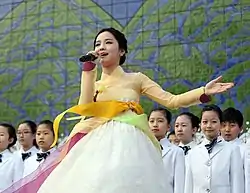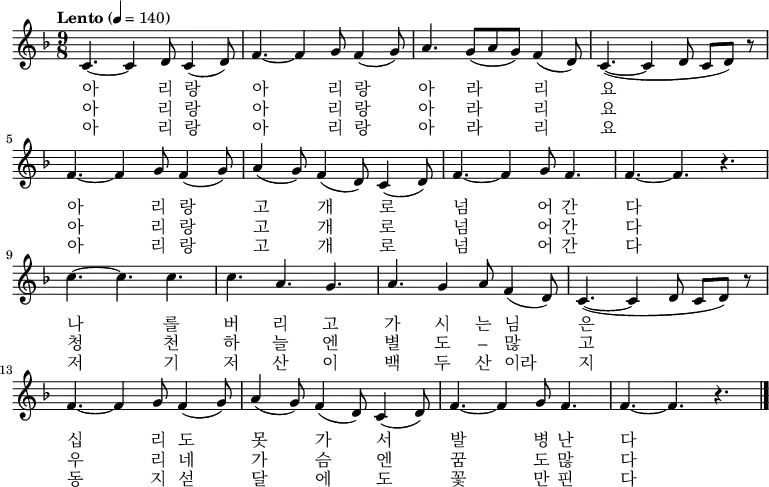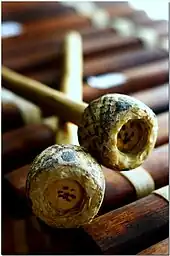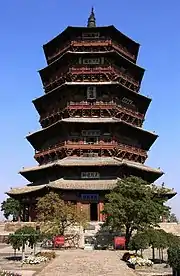Arirang
"Arirang" (아리랑; [a.ɾi.ɾaŋ]) is a Korean folk song.[1] There are about 3,600 variations of 60 different versions of the song, all of which include a refrain similar to "Arirang, arirang, arariyo (아리랑, 아리랑, 아라리요)".[2] It is estimated the song is more than 600 years old.[3]
| Arirang in North Korea | |
|---|---|
.jpg.webp) A man about to depart on a journey through a mountain pass is seen off by a woman in a scene from the Arirang Festival in North Korea. | |
| Country | North Korea |
| Reference | 914 |
| Region | Asia and the Pacific |
| Inscription history | |
| Inscription | 2014 (9th session) |
| Arirang in South Korea | |
|---|---|
 Song So-hee performing "Arirang" | |
| Country | South Korea |
| Reference | 445 |
| Region | Asia and the Pacific |
| Inscription history | |
| Inscription | 2012 (7th session) |
| Arirang | |
| Hangul | 아리랑 |
|---|---|
| Revised Romanization | Arirang |
| McCune–Reischauer | Arirang |
| IPA | a.ɾi.ɾaŋ |
"Arirang" is included twice on the UNESCO Intangible Cultural Heritage list. South Korea successfully submitted the song for inclusion on the UNESCO list in 2012.[3][2] North Korea also successfully submitted the song for inclusion in 2014.[1][4] In 2015, the South Korean Cultural Heritage Administration added the song to its list of important intangible cultural assets.[5]
The song is sung today in both North and South Korea, and represents the symbol of unity in the region that is divided by the Korean War.
History
Origin and Ethnomusicology
It is believed that "Arirang" originated from Jeongseon, Gangwon Province. "Arirang" as a term today is ambiguous in meaning, but some linguists have hypothesized that "Ari" (아리) meant "beautiful" and "rang" (랑) referred to a "beloved one" or "bridegroom" in the ancient native Korean language. With the two words together, the term Arirang meant "My beloved one".[6] This theory, supported by the scholars such as Shin Yong-ha,[7] bears the song's legend. According to the legend, the name is derived from the story of a bachelor and a maiden who fell in love while picking Camellia blossoms near the wharf at Auraji (아우라지) — a body of water which derives its name from the Korean word "eoureojida" (어우러지다) that is closely translated to "be in harmony" or "to meet". For example, the body of water that connects the waters of Pyeongchang and Samcheok to the Han River is called Auraji.[8] Two versions of this story exist:
- In the first one, the bachelor cannot cross the Auraji to meet the maiden because the water is too high, so they sing a song to express their sorrow.
- In the second version, the bachelor attempts to cross the Auraji and drowns, singing the sorrowful song after he dies.[9]
According to Professor Keith Howard, Arirang originated in the mountainous regions of Jeongseon, Gangwon, and the first mention of the song was found in a 1756 manuscript.[10] The Academy of Korean Studies also shares the same view that Arirang was originally the folk song of Jeongseon. Some locals of Jeongseon trace their folk song further back to the era of Goryeo.[11]
Some believe that such song from Jeongseon spread to Seoul and other regions of Korea when the workers from Gangwon were sent to Seoul to rebuild the Gyeongbok Palace under the order of the Prince Regent Heungseon of the Joseon dynasty.[11] Others especially theorize that the words "Arirang" and "Arari" in the song's lyrics originated from the families of the workers during this period who said "Arirang (아리랑; 我離郞)" or "Ananri (아난리; 我亂離)" to the officials taking the workers from their Gangwon homes to the palace construction in Seoul, the phrases which meant they cannot be separated from their lovers or families respectively.[12][13] According to Maecheonyarok (매천야록; 梅泉野錄) recorded by the Joseon scholar Hwang Hyeon, it seemed the song was widespread in the country by this time.[11]
The South Korean literary scholar Yang Ju-dong theorized that the term "Arirang" came from the combination of "Ari" (아리), the old Korean indigenous word that also meant "long", and "ryeong" (Korean: 령; Hanja: 領; lit. hill).[14]
Some trace the term "Arirang" to the name of Lady Aryeong, the wife of the first king of Silla, as the song could have evolved from the poem praising her virtues. Others even speculate that the term is linked to the Jurchen word "Arin" meaning "hometown", or the name of the Indian god with similar name.[15]
First recording
The first known recording of "Arirang" was made in 1896 by American ethnologist Alice C. Fletcher. At her home in Washington, D.C., Fletcher recorded three Korean students singing a song she called "Love Song: Ar-ra-rang".[16][17] One source suggests that the students belonged to noble Korean families and were studying abroad at Howard University during the period in which the recording was made.[18] Another source suggests that the singers were Korean workers who happened to be living in America during that time.[19] The recordings are currently housed in the U.S. Library of Congress.[20]
Resistance anthem
During the Japanese occupation of Korea it became a criminal offense for anyone to sing patriotic songs, including Korea's national anthem, so Arirang became an unofficial resistance anthem against Imperial Japanese rule.[21][22] Korean protesters sang "Arirang" during the March 1 Movement, a Korean demonstration against the Japanese Empire in 1919. Many of the variations of "Arirang" that were written during the occupation contain themes of injustice, the plight of labourers, and guerrilla warfare. It was also sung by the mountain guerrillas who were fighting against the fascists.[21]
The most well-known lyrics to "Arirang" first appeared in the 1926 silent film Arirang, directed by Na Woon-gyu. Arirang is now considered a lost film but various accounts say the film was about a Korean student who became mentally ill after being imprisoned and tortured by the Japanese. The film was a hit upon its release and is considered the first Korean nationalist film.[23][21][24]
Popularity in Japan
During the Japanese occupation of Korea, Japan experienced a craze for Korean culture and for "Arirang", in particular. Over 50 Japanese versions of "Arirang" were released between 1931 and 1943, in genres including pop, jazz, and mambo.[21] Some Japanese soldiers were familiar with "Arirang" from their service in Japanese Korea, or from their interactions with forcibly conscripted Korean comfort women, labourers and soldiers.
Musical score

Lyrics
All versions of "Arirang" include a refrain similar to, "Arirang, arirang, arariyo (아리랑, 아리랑, 아라리요)."[2] The word "arirang" itself is nonsensical and does not have a precise meaning in Korean.[25] While the other lyrics vary from version to version, the themes of sorrow, separation, reunion, and love appear in most versions.[4][26]
The table below includes the lyrics of "Standard Arirang" from Seoul. The first two lines are the refrain. The refrain is followed by three verses.
| Hangul/Chosŏn'gŭl | Hanja | Romanization | English translation[26][27] |
|---|---|---|---|
아리랑, 아리랑, 아라리요... |
아리랑, 아리랑, 아라리요... |
Arirang, arirang, arariyo... |
Arirang, arirang, arariyo... |
나를 버리고 가시는 님은 |
나를 버리고 가시는 님은 |
Nareul beorigo gasineun nimeun |
My love, if you abandon me |
청천하늘엔 잔별도 많고, |
晴天하늘엔 잔별도 많고, |
Cheongcheonhaneuren janbyeoldo manko, |
Just as there are many stars in the clear sky, |
저기 저 산이 백두산이라지, |
저기 저 山이 白頭山이라지, |
Jeogi jeo sani baekdusaniraji, |
There, over there, that mountain is Baekdu Mountain, |
Variations
There are an estimated 3,600 variations of 60 different versions of "Arirang".[2] Titles of different versions of "Arirang" are usually prefixed by their place of origin.[15]
While "Jeongseon Arirang" is generally considered to be the original version of the song, "Bonjo Arirang" (literally: Standard Arirang) from Seoul is one of the most famous versions. This version was first made popular when it was used as the theme song of the influential 1926 film Arirang.[15]
Other famous variations include "Jindo Arirang" from South Jeolla Province, a region known for being the birthplace of Korean folk music genres pansori and sinawi; and "Miryang Arirang" from South Gyeongsang Province.[28][29]
Official status
China
In 2011, Arirang was added to the 3rd batch of "List of Representative Items of National Intangible Cultural Heritage of China'.[30]
In 2023, to celebrate the 70th anniversary of the founding of the Yanbian Korean Autonomous Region, ethnic Korean singer Cui Liling published the first Arirang variation about the Heaven Lake on Jangbaeksan.[31]
UNESCO
Both South Korea and North Korea submitted "Arirang" to be included on the UNESCO Intangible Cultural Heritage list. South Korea successfully submitted the song for inclusion in 2012.[3][2] North Korea successfully submitted the song for inclusion in 2014.[1][4]
South Korea
In 2015, the South Korean Cultural Heritage Administration added the "Arirang" to its list of important intangible cultural assets.[5]
U.S. Army
The U.S. Army's 7th Infantry Division adopted "Arirang" as its official march song in May 1956, after receiving permission from Syngman Rhee, the first president of South Korea. The division had been stationed in South Korea from 1950 to 1971, including the Korean War period.[32]
In popular culture
Music
- American composer John Barnes Chance based his 1962–63 concert band composition Variations on a Korean Folk Song on a version of "Arirang" that he heard in Korea in the late 1950s.[33]
- In 2007, South Korean vocal group SG Wannabe released the album The Sentimental Chord which contains a song entitled "Arirang". The group is accompanied by Korean traditional instruments and the actual Arirang melody is played by an electric guitar during the bridge prior to the key change.[34][35] They have since performed the song live with the National Traditional Orchestra of Korea and at several Arirang Festivals.
- The New York Philharmonic performed "Arirang" for an encore during its trip to North Korea on February 26, 2008.[36]
- In November 2013, the student choir at Hankuk University of Foreign Studies performed "Arirang" in English, Chinese, Japanese, French, Italian, Spanish, German, Russian, Arabic and Korean.[37]
- The K-Pop group, A.C.E, performed "Jindo Arirang (Prehistory)" for the Revival of Arirang program on Arirang Culture. Their unique version that stayed true to the original song is also included on their new album, Changer: Dear Eris.
- Another K-Pop group, KINGDOM, performed "Last flower (화월가 (밀양아리랑))", their own reinterpretation of Miryang Arirang, for the Korean traditional New Year music special “When Gugak Meets K-POP” aired on Arirang TV on January 13, 2023.
Films
- Arirang is the title of early Korean filmmaker Na Woon-gyu's influential 1926 film, which popularized the song "Arirang" in the 20th century.[15]
- Arirang is also the title of a 2011 South Korean documentary. The film won the top prize in the Un Certain Regard category at the 2011 Cannes Film Festival.[38]
Media
- Arirang TV and Arirang Radio are international English-language media stations run by the Korea International Broadcasting Foundation.[39][40]
Sports
- North Korea's mass gymnastics and performance festival is commonly known as the Arirang Festival.[41]
- At the 2000 Summer Olympics opening ceremony in Sydney, Australia, South Korean and North Korean athletes marched into the stadium together carrying the Korean Unification Flag while "Arirang" played.[42]
- South Korean fans used "Arirang" as a cheering song during the 2002 FIFA World Cup.[15]
- South Korean figure skater Yuna Kim performed to "Arirang" during her free skate in the 2011 World Figure Skating Championships, where she placed second.[43]
- Parts of "Arirang" were used many times during the Pyeongchang 2018 Winter Olympics, especially during the Opening Ceremony[44] and in the Olympic Broadcasting Services TV Intro. During the gala show of figure skating, Choi Da-bin skated to "Arirang".
- At the 2018 Asian Games, "Arirang" was played when the Korea Unification Team won the gold medal in canoeing.[45]
- South Korean figure skater Haein Lee performed to "Arirang" during her free skate in the 2022 Four Continents Figure Skating Championship , where she placed second.[46]
Video games
- Kim Wu's theme in Killer Instinct has elements of "Arirang", sung by Hoona Kim.[47]
- "Arirang" is used as the Korean civilization's theme in Sid Meier's Civilization VI.[48]
- "Horangi Arirang" is the name of Hwang's theme in Soul Calibur Soul Calibur.[49]
References
- "N. Korea's Arirang wins UNESCO intangible heritage status". Yonhap News Agency. November 27, 2014. Archived from the original on December 6, 2017. Retrieved December 5, 2017.
- "Arirang, lyrical folk song in the Republic of Korea". Intangible Cultural Heritage. UNESCO. Retrieved December 5, 2017.
- Chung, Ah-young (December 12, 2012). "'Arirang' makes it to UNESCO heritage". The Korea Times. Retrieved December 5, 2017.
- "Arirang folk song in the Democratic People's Republic of Korea". Intangible Cultural Heritage. UNESCO. Retrieved December 5, 2017.
- "'Arirang' Listed as National Intangible Asset". The Chosun Ilbo. July 15, 2015. Retrieved December 5, 2017.
- "Singing". Korean Folk Song, Arirang. Retrieved March 9, 2021.
- "[신용하의 새로 쓰는 한국문화]아리랑(下)". Segye Ilbo (in Korean). Segye Ilbo. January 15, 2003. Retrieved December 19, 2021.
- "Auraji Lake (아우라지) – Sightseeing – Korea travel and tourism information". www.koreatriptips.com. Retrieved March 9, 2021.
- The National Folk Museum of Korea (2014). Encyclopedia of Korean Folk Literature. Vol. Encyclopedia of Korean Folklore and Traditional Culture Vol. III. 길잡이미디어. pp. 95–96. ISBN 978-8928900848.
- Howard, Keith (May 15, 2017). Perspectives on Korean Music: Preserving Korean Music: Intangible Cultural Properties as Icons of Identity. Vol. I. Taylor & Francis. ISBN 978-1-351-91168-9.
- "아리랑". Academy of Korean Studies. Retrieved December 19, 2021.
- "아리랑설". Korea Creative Content Agency. Retrieved December 19, 2021.
- "아난리설". Korea Creative Content Agency. Retrieved December 19, 2021.
- "아리령 설". Korea Creative Content Agency. Retrieved December 19, 2021.
- "From lyrical folk song to cheering song: variations of 'Arirang' in Korean history". The Korea Times. Yonhap News Agency. December 6, 2012. Retrieved December 6, 2017.
- Yoon, Min-sik (September 27, 2017). "Oldest recorded Arirang to be on display in Seoul". The Korea Herald. Retrieved December 7, 2017.
- Kim, Hyeh-won (May 11, 2012). "Arirang under renewed light ahead of UNESCO application". Yonhap News Agency. Retrieved December 7, 2017.
- Provine, Robert C. "Alice Fletcher's Notes on the Earliest Recordings of Korean Music" (PDF). The Academy of Korean Studies. Archived from the original (PDF) on December 8, 2017. Retrieved December 7, 2017.
- Maliangkay, Roald (2007). "Their Masters' Voice: Korean Traditional Music SPs (Standard Play Records) under Japanese Colonial Rule". The World of Music. 49 (3): 53–74. ISSN 0043-8774. JSTOR 41699788.
- "Alice C Fletcher collection of Korean cylinder recordings". Library of Congress. 1896. Retrieved December 7, 2017.
- Atkins, E. Taylor (August 2007). "The Dual Career of "Arirang": The Korean Resistance Anthem That Became a Japanese Pop Hit". The Journal of Asian Studies. 66 (3): 645–687. doi:10.1017/s0021911807000927. hdl:10843/13185. JSTOR 20203201. S2CID 162634680. Archived from the original on May 16, 2022. Retrieved July 7, 2019.
- Koehler, Robert (2015). Traditional Music: Sounds in Harmony with Nature. Volume 8 of Korea Essentials. Seoul Selection. ISBN 978-1624120428.
- Edwards, Matthew (2014). Film Out of Bounds: Essays and Interviews on Non-Mainstream Cinema Worldwide. McFarland. p. 198. ISBN 978-1476607801.
- Taylor-Jones, Kate (2017). Divine Work, Japanese Colonial Cinema and its Legacy. Bloomsbury USA. ISBN 978-1501306136.
- "Arirang (아리랑)". Sejong Cultural Society. 2015. Retrieved December 6, 2017.
- Kim Yoon, Keumsil; Williams, Bruce (2015). Two Lenses on the Korean Ethos: Key Cultural Concepts and Their Appearance in Cinema. McFarland. p. 39. ISBN 978-0786496822.
- Damodaran, Ramu (Winter 2017). "UNAI Impacts Scholarship, Research for Greater Good". SangSaeng. APCEIU. 49: 23.
- "Jindo Arirang". Sejong Cultural Society. 2015. Retrieved December 6, 2017.
- "Milyang Arirang". Sejong Cultural Society. 2015. Retrieved December 6, 2017.
- "Arirang – List of Representative Items of National Intangible Cultural Heritage (阿里郎 – 国家级非物质文化遗产代表性项目名录)". China Intangible Cultural Heritage Network (中国非物质文化遗产网). Retrieved February 19, 2023.
- "The world's first Tianchi-themed Arirang "Tianchi Arirang"". bilibili. 崔丽玲. Retrieved May 23, 2023.
- "Chronological History 7th Infantry Division". 7th Infantry Division Association. May 25, 2012. Retrieved December 7, 2017.
- Miles, Richard B; et al. (2010). Teaching Music Through Performing in Band Volume 1. Chicago: GIA Publications, Inc. pp. 590–598.
- "SG워너비, 1년만에 '컴백'...4집 '아리랑' 발표". The Chosun Ilbo (in Korean). March 30, 2007.
- "[안&밖] SG워너비 '국악 접목' 뜻은 좋았지만 …". JoongAng Ilbo (in Korean). May 21, 2007.
- Wakin, Daniel J. (February 27, 2008). "North Koreans Welcome Symphonic Diplomacy". The New York Times. ISSN 0362-4331. Retrieved December 7, 2017.
- Lee, Claire (November 19, 2013). "HUFS to hold concert featuring 'Arirang' in 10 languages". The Korea Herald. Retrieved December 8, 2017.
- Bradshaw, Peter (June 7, 2012). "Arirang – review". The Guardian. ISSN 0261-3077. Retrieved December 8, 2017.
- "Arirang TV begins DTV service in metropolitan Washington, D.C., area". The Korea Times. Yonhap News Agency. April 28, 2011. Retrieved December 8, 2017.
- "Arirang Radio to Go On Air in U.S." The Chosun Ilbo. January 11, 2012. Retrieved December 8, 2017.
- DeHart, Jonathan (July 29, 2013). "Pyongyang's Arirang Festival: Eye Candy for the Masses". The Diplomat. Retrieved December 7, 2017.
- Ito, Makoto (September 16, 2000). "Two Koreas make history during opening ceremony". The Japan Times Online. ISSN 0447-5763. Retrieved December 8, 2017.
- Hersh, Philip (April 30, 2011). "Botched jumps cost Kim world title, Czisny the bronze". Chicago Tribune. Retrieved December 7, 2017.
- "Do passado ao futuro cerimonia de abertura de pyeongchang projeta futuro de crianças (In Portuguese)". Sport TV. February 9, 2018. Archived from the original on February 27, 2018. Retrieved February 9, 2018.
- AS, Diario (August 27, 2018). "Unified Korea dragon boat team win historic gold at Asian Games". AS.com. Retrieved August 29, 2018.
- "In Tallinn, Mihara reclaims Four Continents title; U.S. pairs finish 1–2". January 25, 2022.
- Archived at Ghostarchive and the Wayback Machine: Celldweller & Atlas Plug (March 10, 2016), Killer Instinct Season 3 – Creating The Music for "Kim Wu", retrieved February 8, 2020
- "Geoff Knorr's Facebook Page". Facebook. Retrieved January 26, 2018.
- "Youtube Link Page". YouTube. Retrieved January 26, 2018.

